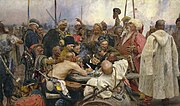This article has multiple issues. Please help improve it or discuss these issues on the talk page. (Learn how and when to remove these messages)
|
| Free Cossacks | |
|---|---|
 1st Congress of Free Cossacks (Chyhyryn, October 1917) | |
| Active | 1917–1918 |
| Country | Ukraine |
| Allegiance | Ukrainian People's Republic |
| Branch | Free Cossacks |
| Type | Corps, territorial army |
| Role | infantry, law enforcement |
| Size | ~3,000 (18 May 1917) 60,000 (at the 1st Congress of Free Cossacks) |
| Engagements | |
| Commanders | |
| Notable commanders | Semen Hryzlo, Pavlo Skoropadsky[1] |
| Part of a series on |
| Cossacks |
|---|
 |
| Cossack hosts |
| Other Cossack groups |
| History |
| Notable Cossacks |
| Cossack terms |
| Cossack folklore |
Free Cossacks (Ukrainian: Вільне козацтво) were Ukrainian Cossacks that were organized as volunteer militia units in the spring of 1917 in the Ukrainian People's Republic. The Free Cossacks are seen as precursors of the modern Ukrainian national law enforcement organizations such as the National Guard of Ukraine or the Internal Troops of Ukraine.
The primary purpose of those militia formations was to provide security and civil order for the local population. The consolidation process of various smaller units started sometime in April near the town of Zvenyhorodka, Kiev Governorate during the local assembly of the Free Cossacks which created the Zvenyhorodka Kosh (battalion). The assembly elected Semen Hryzlo the Kosh Otaman, who became the otaman of Kalnyboloto Kurin (company). Under this title, he was delegated to the 2nd All-Ukrainian Military Congress in Kiev in June 1917.
Hryzlo was also one of the organizers of the 1st All-Ukrainian Congress of the Free Cossacks that took place on October 3, 1917, in the former Cossack capital of Chyhyryn. The congress elected the Hetman of All Ukraine, who became General Pavlo Skoropadskyi. Hryzlo was elected as the General Yesaul.
The Free Cossacks units distinguished themselves during the Ukrainian-Soviet War (particularly from December 1917 to April 1918) and were disbanded around May and June 1918. In January-April 1918 the Ukrainian government tried to create the Free Registered Cossack Troops for county security, but after the April coup-d'etat led by Pavlo Skoropadsky all Free Cossacks formations were officially dissolved.
- ^ Воспоминания : Конец 1917 - декабрь 1918 / Павел Скоропадский; [вступ. ст. В.Г. Черкасова-Георгиевского]. - М. : ПРОЗАиК, 2019. - 315, [5] с., [24] с. ил. ISBN 978-5-91631-282-9